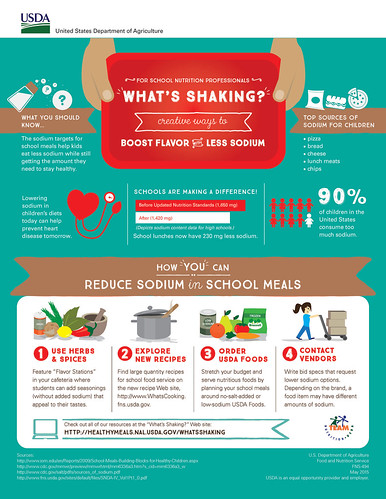
What’s shaking in USDA’s school meals programs? Delicious and nutritious food, that’s what! Healthy food does not have to be bland or boring. There’s more to creating a tasty meal than just dousing food in dressing or layering on salty sauces. It’s easy to make your dish pop without adding excess sodium. Many schools around the country have figured out creative ways to serve low-sodium meals that maximize taste. So what can you do this school year to “spice” things up and take school meals to the next level?
- Add flavor, not salt – Condiments like soy sauce, ketchup, barbecue sauce, and hot sauce may contain high amounts of sodium. Fresh or dried herbs, spices, lemon or orange zest, or 100 percent fruit juices can enhance flavors in foods naturally.
- Cook with fresh food – When possible, cook with fresh produce or minimally processed foods like no-salt-added frozen or canned vegetables. Setting up farm to school arrangements help make this a cinch! USDA Foods also offers a variety of options.
- Set up “Flavor Stations” – Create “flavor stations” in the cafeteria where students can add sodium-free herbs and spices such as basil, curry, black and red pepper, garlic, ginger, or rosemary to customize meals to their taste buds. Flavor stations give students a chance to be the chef and create one-of-a-kind dishes!
- Check out “What’s Cooking?” – This USDA site features hundreds of low sodium, large quantity recipes for inspiration. How about some “Rainbow Rice” or “Honey-Lemon Chicken”? Yes, please!
- Shop around – Pay attention to sodium levels when you’re purchasing food. The amount can vary widely from brand to brand. Be sure to write bids that specifically request lower sodium options.
Does your school have any other creative ways to boost flavor while still promoting healthy, low-sodium diets? Share them with us in the comments section below! To find more USDA resources for schools to maximize taste without maximizing sodium, check out our What’s Shaking? site.
